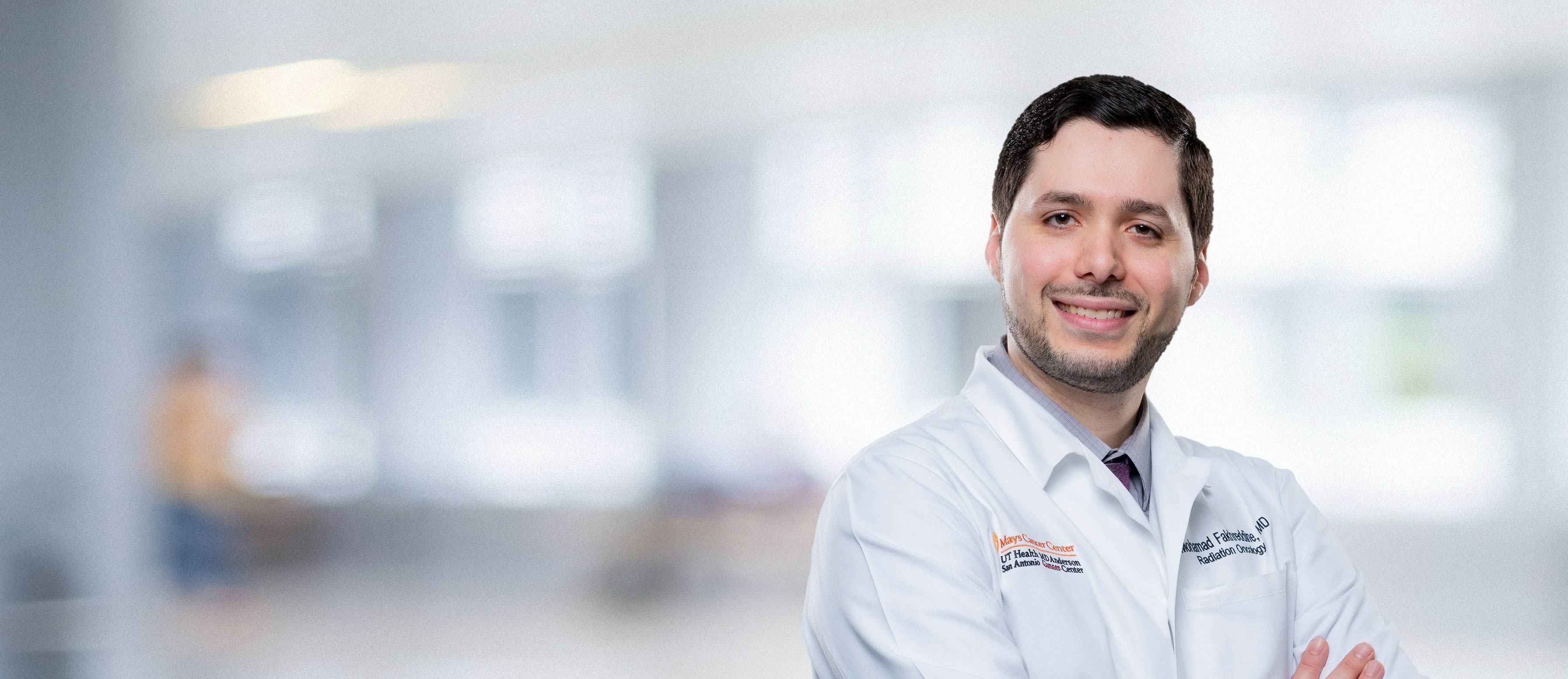Meet the Experts: Mohamad Fakhreddine, M.D.


“I hope all my patients feel they’ve been listened to with compassion, and I hope I’ve helped them really understand what’s going on with their care.”
The specialty of radiation oncology is unique in the cancer care field. Part engineering. Part physics. Part science and invention. For all its technical aspects, the most important element says UT Health San Antonio MD Anderson Cancer Center’s Mohamad Fakhreddine, M.D., is a compassionate human connection.
“My undergraduate studies were in engineering, which I enjoyed, but I wanted it to mean something more,” says Dr. Fakhreddine. “It was kind of a happy accident that I ended up in this field, but I’m glad I did. I really appreciate the human element of it.”
As a radiation oncologist, Dr. Fakhreddine uses precisely targeted and measured doses of radiation to attack and shrink cancerous tumors. Sometimes, the goal of treatment is to eliminate tumors. Other times, the goal is to shrink tumors or slow their growth to reduce symptoms and improve a patient’s quality of life.
“It’s amazing what we can do, and it’s amazing what we can’t do. The media shows the miracles, of course, but there are still so many things we can do to bring relief to patients for whom a cure may not be feasible,” he says. “I try to promote a sense of realistic optimism when I talk with patients, whether the goal is cure or care. Both are important.”
Realistic optimism, says Dr. Fakhreddine, comes from open, honest communication between providers and their patients.
“You have to listen, to ask patients what they know already and, more importantly, what they want to know,” he explains. “It’s always a challenge to take the time out of a busy day, but asking those questions can open the door for some really important conversations.”
One of the most frequent conversations, Dr. Fakhreddine shares, revolves around what patients can expect while undergoing radiation therapy, in terms of both the outlook for their cancer and the effect that treatment will have on their everyday lives.
“Few patients come into treatment understanding how much their opinions and feelings can influence how we plan their course of care,” says Dr. Fakhreddine, emphasizing the collaborative nature of his relationship with patients. “I hope all my patients feel they’ve been listened to with compassion, and I hope I’ve helped them really understand what’s going on with their care.”
A common concern among Dr. Fakhreddine’s patients involves their expectations of discomfort and disruption associated with their treatment.
“We are always looking for ways to do more with less so that people can get back to their lives rather than spending all their time with us,” Dr. Fakhreddine says. He points to recent advances in radiation oncology, such as using fewer but higher doses of radiation to treat prostate cancer in far less time. Another exciting development is the use of radiation to attack multiple brain tumors at once, a dozen or more versus one or two. Both developments are possible only because of advances in precision targeting technology over the last five-to-ten years.
One potentially promising innovation in radiation targeting that is currently being worked on by Dr. Fakhreddine and others working at UT Health San Antonio MD Anderson. By integrating artificial intelligence (AI) into treatment planning processes, researchers hope to make radiation therapy both more precise and more efficient.
“As treatment progresses, tumors shrink and patients lose weight, which requires us to make very nuanced adjustments to the targeting and the intensity of treatment,” Dr. Fakhreddine explains. “Using smart machines to automate some of these fine adjustments could create a better result while freeing us up to spend more time focused on patients and their care. We’re still a way away from having a system we can fully trust, but we’re getting closer.”
An Austin native, Dr. Fakhreddine is an Assistant Professor in the Department of Radiation Oncology. He graduated from the University of Texas at Austin with a degree in mechanical engineering with high honors and proceeded to complete his medical school training at Baylor College of Medicine in the Texas Medical Center in Houston. After an intern year at Union Memorial Hospital, he completed his radiation oncology training at UT Health San Antonio.
Dr. Fakhreddine’s clinical practice focuses on treating gynecologic cancers and genitourinary cancers, including cervical, endometrial, prostate, and bladder cancer. His research interests include using artificial intelligence to improve radiation treatment planning and delivery, large-scale cancer database studies, and research aimed at improving physician-patient communication in difficult circumstances.
To learn more about the family of experts at UT Health San Antonio MD Anderson Cancer Center, or to schedule an appointment, visit UTHealthsaMDAnderson.org or call 210-450-1000.

 Close
Close